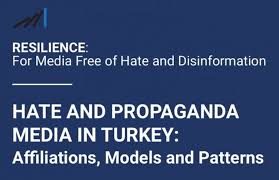Source: Bianet, 29 September 2020
As part of the Resilience Project, a report was published on hate and propaganda media in Turkey in collaboration with the IPS Communication Foundation/bianet.
Written by Sinem Aydınlı (PhD), the report is the result of a study conducted from May to July 2020 and offers a general overview of the political and economic affiliations of the hate and propaganda media in Turkey. It is also based on to the independent reports of organizations monitoring hate speech in Turkey’s media, namely the Hrant Dink Foundation, KAOS GL (Kaos Gay and Lesbian Cultural Research and Solidarity Association) and the Media and Refugee Rights Association.
Highlighting the political and economic background of the hate and propaganda produced in the media during the ruling Justice and Development Party (AKP) period, the report offers the following content:
“Ownership Structures of Hate and Propaganda Media” part of the report summarizes the hate and propaganda media in Turkey in terms of some pro- and anti-AKP media outlets’ economic and political affiliations (including examples about Radio and Television Supreme Council (RTÜK) and Press Advertising Agency (BİK) policies on the critical media).
“Organization of Hate, Disinformation and Propaganda in the Media” part addresses the contents of hate, disinformation and propaganda models and certain stereotypes shared through certain media outlets (including hate speech and disinformation against Kurdish politicians, LGBTI+s and Syrian refugees).
In the “Conclusion“, the main findings of the research and the urgent needs in relation to the current mediascape in Turkey are listed.
The report listed several recommendations at the end for further action in countering hate speech and disinformation in general and specifically concerning media ownership in Turkey.
You can these policy recommendations below followed by the full report as a PDF format.
POLICY RECOMMENDATIONS OF THE REPORT
- Monitoring of financial connections between media owners and government should be performed on a regular basis by the NGOs conducting media ownership watch to indicate interdependence between the ruling party/government and hate and propaganda media and their owners. This raises awareness of the need for new regulation of media ownership and concentration as well as inviting those media to provide full transparency concerning their finances specifically in terms of public contracts.
- Data mapping for “media owners and their other investments” through networks such as the “Network of Dispossessions” should be updated on a regular basis otherwise a new open access database or map should be established by the NGOs and volunteers working with them and the reports should be published at least quarterly. This would help to evaluate the financial background of hate and propaganda media.
- Journalists, academics, lawyers, representatives of NGOs, human rights defenders, independent volunteers, listeners, readers, viewers and those groups who are most exposed to hate speech in the media should work together under a shared platform and/or coalition in order to create a common mechanism through which hate speech and disinformation can be scanned, monitored, reported and countered regularly and consistently.
- These reports should be shared with the government, Parliament, law makers, local authorities, media regulatory bodies, professional associations, media literacy educators and fact-checking platforms to be able to develop common strategies and policies.
- A self-regulatory body should be established and developed by the non- governmental organisations who conduct media monitoring in order to render hate speech and disinformation in all media visible.
- Social media monitoring in relation to hate and propaganda media should be conducted effectively by non-governmental organisations. They should develop the mechanisms and tools to facilitate the monitoring and publishing of “Social Media Hate Watch” reports weekly, monthly, and yearly.
- A glossary and booklets should be prepared together with journalists, academics, and NGOs monitoring hate speech in media to preclude the hate language in the media.
- In order to distinguish which institutions or individuals benefit from impunity, a monitoring mechanism should be established to render the judiciary’s different interpretations of the boundaries between hate speech and freedom of expression visible.
- Parallel to this, the judiciary bodies such as lawyers or judges can be trained in relation to the provisions in the international documents and practices of European Court of Human Rights on this issue.

